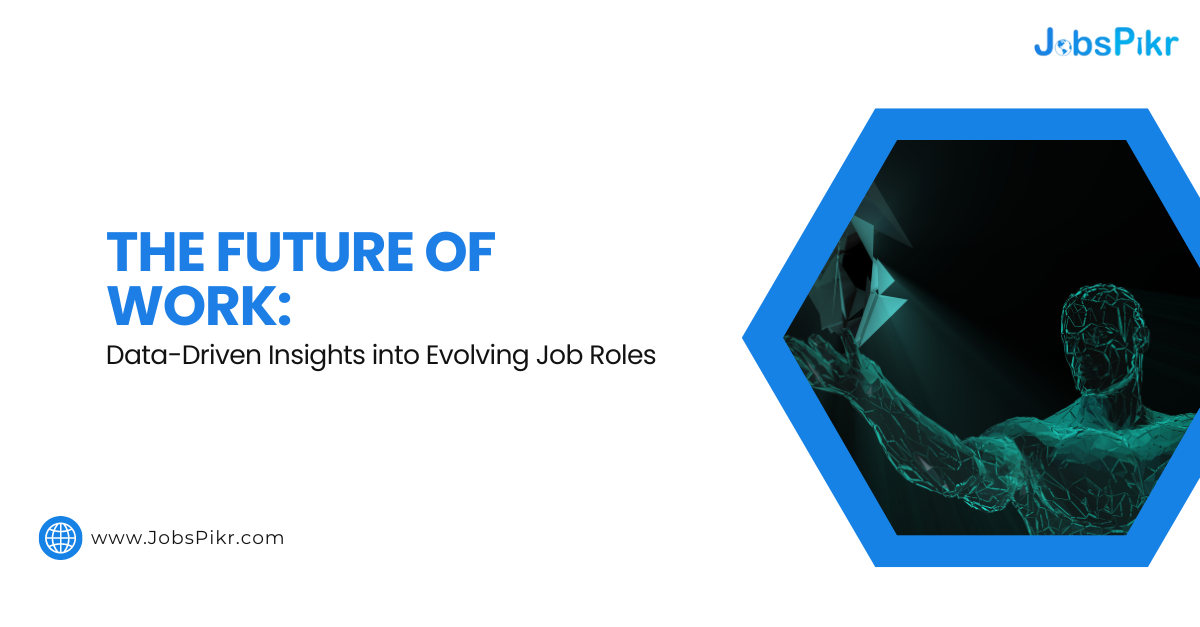The future of work is a topic of immense interest as technological advancements and global trends continue to reshape the employment landscape. One of the most significant drivers of this transformation is data. Data Driven insights are providing valuable information on how job roles are evolving and what skills will be in high demand in the coming years. This article explores how data is shaping the future of work, the emerging job roles, and the skills that will be crucial for success.

The Role of Data in Shaping the Future of Work
Data has become a critical asset in today’s digital economy. Companies across industries are leveraging data to make informed decisions, optimize operations, and drive innovation. In the context of the future of work, data provides insights into labor market trends, employee performance, and the skills needed for various roles. Here’s how data driven insights are influencing the future of work:
1. Identifying Emerging Job Roles
Data analytics allows organizations to identify emerging job roles that are gaining prominence in the market. By analyzing job posting data, company reports, and industry trends, companies can predict which roles will be in demand. For instance, roles related to artificial intelligence, cybersecurity, and data science have seen significant growth in recent years. These insights help businesses prepare for these changes by identifying the skills and qualifications required for these roles.
2. Understanding Skill Gaps
These insights are essential for understanding the skill gaps within the workforce. By analyzing employee performance data and industry benchmarks, organizations can identify areas where their workforce may be lacking. This information is crucial for developing targeted training and development programs to bridge these gaps and ensure employees are equipped with the necessary skills for future roles.
3. Optimizing Talent Acquisition
Data driven insights enhance talent acquisition strategies by providing a clear picture of the talent landscape. Companies can use data to identify the most effective recruitment channels, understand candidate preferences, and predict hiring trends. This enables organizations to attract and retain top talent more efficiently, ensuring they have the right people in place to drive future growth.
4. Enhancing Employee Experience
Data is also transforming the employee experience by providing insights into employee engagement, satisfaction, and productivity. By analyzing job datasets, companies can identify factors that impact employee well-being and implement strategies to improve it. This leads to a more engaged and motivated workforce, which is essential for navigating the evolving job landscape.
Evolving Job Roles: Data Driven Insights
As data continues to shape the future of work, several job roles are evolving to meet the demands of the digital economy. Here are some key roles that are expected to be in high demand:
1. Data Scientists and Analysts
Data scientists and analysts are at the forefront of the data revolution. These professionals are responsible for collecting, analyzing, and interpreting complex data sets to provide actionable insights. As organizations increasingly rely on data to drive decision-making, the demand for skilled data scientists and analysts is expected to grow significantly. Key skills for these roles include statistical analysis, programming, machine learning, and data visualization.
2. AI and Machine Learning Specialists
Artificial intelligence (AI) and machine learning (ML) are transforming various industries, from healthcare to finance to manufacturing. AI and ML specialists develop algorithms and models that enable machines to learn and make decisions. These roles require strong programming skills, a deep understanding of AI and ML concepts, and experience with data engineering. The ability to apply AI and ML to solve real-world problems will be highly valued in the future job market.
3. Cybersecurity Experts
With the increasing frequency and sophistication of cyber threats, cybersecurity has become a top priority for organizations. Cybersecurity experts are responsible for protecting sensitive data and ensuring the integrity of IT systems. These roles require knowledge of network security, encryption, risk management, and compliance. As cyber threats continue to evolve, the demand for cybersecurity professionals is expected to rise.
4. Remote Work Coordinators
The COVID-19 pandemic accelerated the adoption of remote work, and many organizations are now embracing hybrid or fully remote work models. Remote work coordinators are responsible for managing remote teams, ensuring productivity, and maintaining a positive remote work culture. These roles require strong communication and organizational skills, as well as experience with remote collaboration tools and strategies.
Skills in High Demand: Data Driven Insights
As job roles evolve, so do the skills required to perform them effectively. Here are some skills that indicate high demand in the future:
1. Digital Literacy
Digital literacy is the ability to effectively use digital tools and technologies. As technology becomes increasingly integrated into the workplace, digital literacy is becoming a fundamental skill for all employees. This includes proficiency with software applications, understanding digital communication tools, and the ability to navigate digital platforms.
2. Analytical Thinking
Analytical thinking involves the ability to analyze data, identify patterns, and make informed decisions. This skill is essential for roles that require data driven decision-making, such as data scientists, business analysts, and digital marketers. Analytical thinking enables employees to interpret complex data sets and provide actionable insights that drive business outcomes.
3. Adaptability and Flexibility
The rapid pace of technological change requires employees to be adaptable and flexible. This means being open to learning new skills, embracing change, and adapting to new ways of working. Employers value adaptability as it enables employees to thrive in dynamic environments and respond effectively to new challenges.
4. Collaboration and Teamwork
Collaboration and teamwork are critical skills for success in the modern workplace. As organizations adopt remote and hybrid work models, the ability to collaborate effectively with colleagues, regardless of location, is more important than ever. This includes strong communication skills, the ability to work in diverse teams, and proficiency with collaboration tools.
5. Emotional Intelligence
Emotional intelligence (EI) is the ability to understand and manage one’s emotions and the emotions of others. EI is increasingly recognized as a key factor in effective leadership, teamwork, and customer service. Employees with high EI can navigate interpersonal relationships, resolve conflicts, and create a positive work environment.

Source: LinkedIn Pulse
The Future of Work: Embracing Data Driven Insights
The future of work is being shaped by data driven insights that provide valuable information on evolving job roles and the skills needed for success. Organizations that leverage these insights can stay ahead of the curve, attract and retain top talent, and create a dynamic and innovative workplace. Here are some strategies for embracing data driven insights in the future of work:
1. Invest in Data Analytics
Investing in data analytics capabilities is essential for leveraging data driven insights. This includes building a robust data infrastructure, hiring skilled data professionals, and adopting advanced analytics tools. By harnessing the power of data, organizations can make informed decisions and drive strategic initiatives.
2. Foster a Culture of Continuous Learning
As job roles and skills continue to evolve, fostering a culture of continuous learning is critical. This involves providing employees with opportunities for upskilling and reskilling, encouraging lifelong learning, and supporting career development. Organizations that prioritize learning and development will be better equipped to navigate the future of work.
3. Embrace Diversity and Inclusion
Diversity and inclusion are essential for driving innovation and creativity. By embracing diverse perspectives and creating an inclusive work environment, organizations can leverage a wider range of ideas and approaches. This is particularly important in the context of evolving job roles, where diverse teams can provide unique insights and solutions.
4. Adopt Flexible Work Models
Flexible work models, such as remote and hybrid work, are becoming increasingly popular. By adopting these models, organizations can attract a broader talent pool, enhance employee satisfaction, and improve productivity. Flexible work models also enable organizations to adapt to changing circumstances and maintain business continuity.
Conclusion
The future of work is being shaped by data driven insights that provide valuable information on evolving job roles and the skills needed for success. As organizations navigate this dynamic landscape, leveraging data driven insights will be essential for staying ahead of the curve and creating a thriving workplace. By investing in data analytics, fostering a culture of continuous learning, embracing diversity and inclusion, and adopting flexible work models, organizations can position themselves for success in the future of work.



